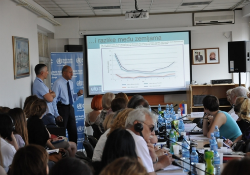National policy dialogue on preventing adverse childhood experiences in Serbia

WHO
A national policy dialogue on preventing adverse childhood experiences (ACEs) was held in Belgrade, Serbia on 14 July 2015, hosted by the City Institute of Public Health of Belgrade, the Ministry of Health and WHO. Around 40 participants attended, representing the ministries of health, labour and social welfare, education, interior, and justice; the Public Prosecutor's Office; the Ombudsman; the Institute of Public Health of Serbia; civil-society organizations; and the United Nations Children's Fund (UNICEF).
Dr Dusanka Matijevic, Director of the City Institute of Public Health, welcomed participants to the workshop and highlighted the long tradition of violence and injury prevention at the Institute, including preventive programmes on child maltreatment such as home visitation. This was followed by Dr Miljana Grbic, Head of WHO Country Office in Serbia, who emphasized the large burden placed on health systems and society at large due to the negative consequences of ACEs and the importance of preventing them. This could be properly addressed through a coordinated, whole-of-government response aimed at prevention, in keeping with Health 2020.
Dr Aleksandra Vlacic, Ministry of Health technical focal point for violence prevention, welcomed participants on behalf of the Ministry, and emphasized the health sector's commitment in preventing and responding to child maltreatment. Dr Milena Paunovic, the lead author of the "Adverse childhood experiences study among university students in Serbia" also welcomed participants, reminding them of the need for strengthened national capacity for a multisectoral response in Serbia.
Effects of ACEs
The Serbian ACE survey was presented by Dr Marija Markovic and Dr Katarina Vojvodic from the City Institute of Public Health. Half the student population surveyed had experienced one or more ACEs. Having 4 or more ACEs increased the likelihood of having started smoking early by 3.3 times, frequent alcohol use by 1.6 times, underage pregnancy by 11.7 times and suicide attempt by 78.2 times.
WHO's work on violence prevention
Dr Dinesh Sethi, Programme Manager, Violence and Injury Prevention at WHO/Europe, presented "Investing in children: the European child maltreatment prevention action plan" and described how WHO would support Member States to attain the 3 objectives of the plan: better surveillance, stronger policy development and implementation of evidence-based prevention programmes. He emphasized the high societal costs due to maltreatment and the fact that investing in prevention was cost-effective.
Ms Dimitrinka Jordanova Peshevska, WHO consultant in violence prevention, presented a situation analysis on child maltreatment in Serbia, developed in consensus with stakeholders from different sectors and highlighted the strengths and gaps. The results of the country profile of Serbia and the "European facts and the Global status report on violence prevention 2014" were also presented.
Next steps
A wide-ranging debate followed covering many important issues such as commitment by different sectors, the need for a national policy to coordinate preventive actions, the need to build capacity and allocate resources, and the importance of sharing data and expertise between different sectors to protect the rights of children and prevent ACEs. The meeting concluded with participants agreeing that the revision in 2015 of the national strategy for the prevention and protection of maltreatment in children presented an opportunity to incorporate preventive programmes as an essential part of protecting children, as well as ending corporal punishment in all settings. The situation analysis with the workshop recommendations would be presented to all the ministries concerned.



